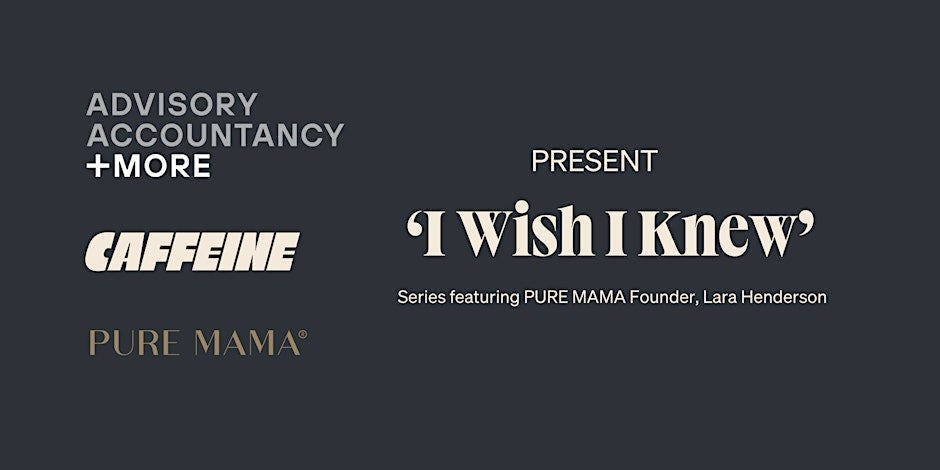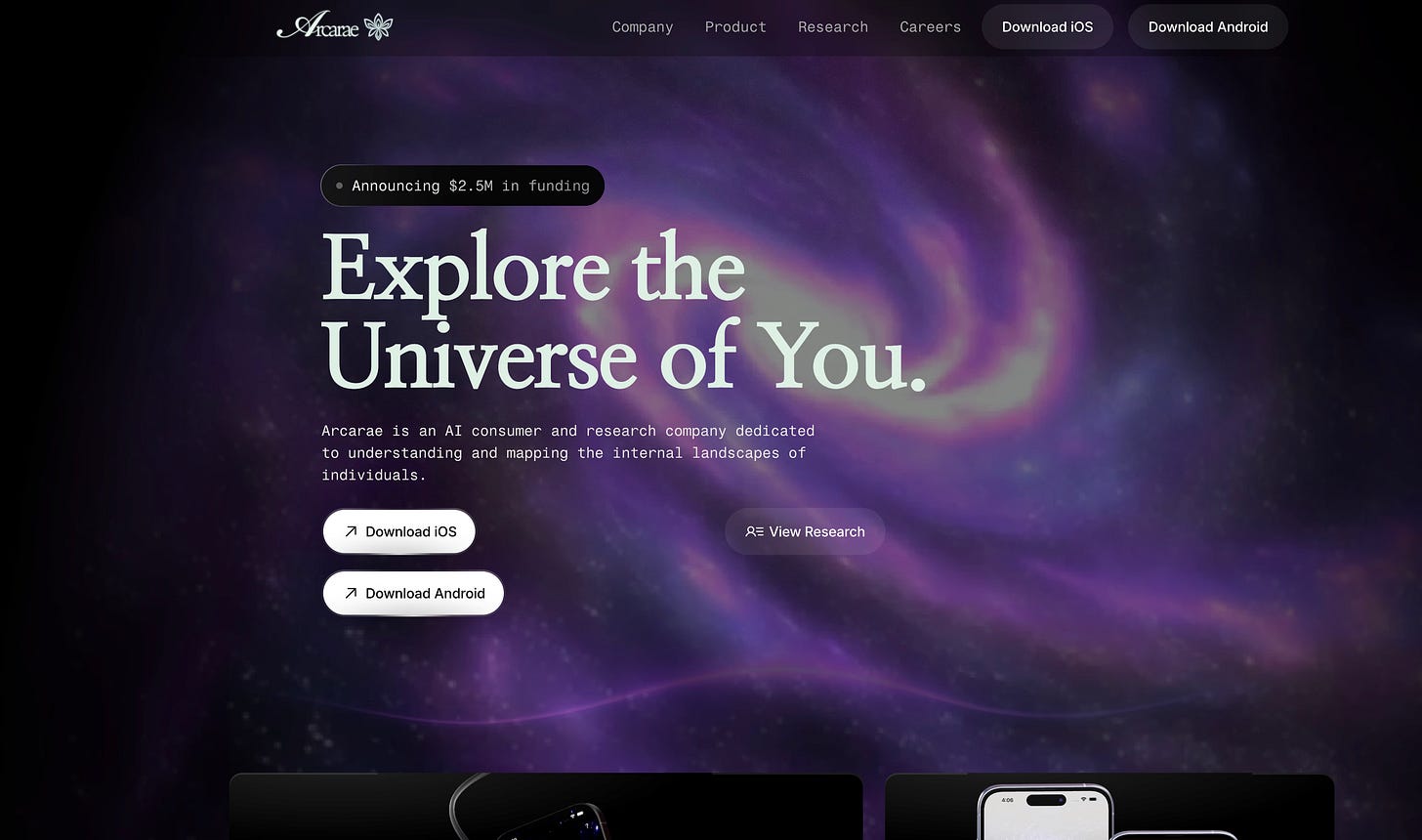Happy Thursday!
Kia ora Caffeinators,
It’s Thursday, the weekend is in sight and I was busy all morning making some new content for you guys (which may or may not feature my actual face for once) which I am excited to share.
For today we have the next in our guest editorial series from BNZ, a reminder about our next in person event in Tauranga and a little check in on the wider world of tech and funding. A lot of people are making a lot of money right now and the bubble vibes are getting mighty strong….
Here’s what’s brewing in your Daily Shot:
How BNZ is rewriting the banking rulebook for founders
‘I Wish I Knew’ With Lara Henderson from PURE MAMA
Anthropic raises $13B Series F at $183B valuation
Google dodges breakup but loses chokehold on search
Are we in the vibe funding epoch of AI?
As always, thank you to everyone who has upgraded to a paid subscription or simply recommended Caffeine to friends and whānau. We couldn’t do any of this without you.
Finn and the CAFFEINE team
How BNZ is rewriting the banking rulebook for founders
When Caffeine first spoke with BNZ’s Head of Technology Industries, Tim Wixon, his vision for the relationship between startups and banks was clear: Design banking around how tech businesses actually operate, rather than forcing them into traditional frameworks.
It’s a philosophy BNZ has already applied to working with thousands of technology companies across New Zealand.
But, as Tim told me when we caught up again recently, the real work is in bridging two worlds that speak different languages.
Crossing the language barrier
“The language of banking is financial statements,” Tim says. “The accounting standards we still work with were developed in the 70s. They weren’t built with the internet, SaaS, or the kind of intangible value creation tech companies specialise in.”
For decades, banks have served asset-heavy, profit-generating companies with predictable cash flows.
Founders building software platforms, gaming studios, or high-tech manufacturing processes didn’t fit the mould and when banks don’t understand something, ‘different’ can quickly be translated into ‘risky’.
Perceived risk scales alongside lack of knowledge about a sector, so the first challenge was recognising the economic value of things you can’t see or touch like brand equity, codebases, and network effects. “We’ve gone deep into understanding technology industry sub-sectors (emerging tech as an example) so we can better understand their unique risks and how to mitigate them,” Tim says. “Banks have always looked for assets you can see and feel. That’s your first division between the two worlds.”
The second challenge is speed. A tech company can go from zero to global in a few years, powered by margins most industries can’t dream of.
“Banks have traditionally looked at profit lines - EBITDA, net profit before or after tax - but what’s interesting to me is revenue quality, scalability, and gross margin,” Tim explains.
Add to that the rise of venture capital and angel investment, and the rules shift again. High-growth companies are often pre-profit for years, deliberately reinvesting every dollar into talent and expansion.
“That’s where we’ve had to figure out how to fund some pre-profit companies in a way that fits our risk tolerance,” Tim says. “It takes some bravery to engage at the start, when it’s not obvious yet.”
While many financial institutions are still catching up, BNZ has been investing in understanding tech for years. But Tim believes founders could find value in also learning more about the language of banking.
“This is a two-way street,” he says. “We have capital and talent on our side that’s valuable to founders. But understanding what metrics we care about can teach founders a lot too.”
While the typical conversation between a bank and a founder might boil down to: “Can you fund us?”, Tim wishes more founders would ask how a bank sees risk in their business, what metrics matter, and even what the pathway might be to work together if the timing isn’t right now.
“One of the most underutilised things in banking is the insight we can give,” he says. “We’ve got this wide-angle view of the market. We can share themes and observations gleaned from others doing something similar, what we’ve seen work, and where we’ve seen challenges. But very few people ask.”
Founder housing and scale-up support
Some of BNZ’s most founder-friendly initiatives have come directly from conversations like these.
The bank’s new founder housing programme, for example, was designed to tackle a challenge tech entrepreneurs were encountering, where they were struggling to access home loans despite running successful, fast-growing companies.
“You could have someone hiring dozens of people on great salaries, and those employees can get a mortgage, but the founder can’t because their company is cash-burning,” Tim says. “It didn’t feel right. We’d been helping founders on this front on an ad-hoc basis for years, so we made it mainstream.”
The fix: remove the penalty for having a cash-burning company when assessing personal borrowing capacity. BNZ’s Founder Housing evaluates business viability, potential and cash runway rather than focusing solely on profit and loss statements.
BNZ’s Scale Up portfolio applies the same principle to business lending. It selects 15-20 of New Zealand’s highest-potential tech companies and adapts BNZ’s rules to fit their growth and strategy, rather than forcing them into a traditional banking framework.
“We’re experimenting with different covenants — revenue-based, recurring or not, minimum cash balances instead of EBITDA requirements, as examples,” Tim explains. “These are globally oriented companies, often in SaaS or fintech to date, with $10-$60 million in revenue and well above double-digit growth. Traditionally, that level of growth would make banks nervous. But we see huge potential in supporting them.”
Rethinking risk
When I asked about what sectors Tim had an eye on in particular, he highlighted high-tech manufacturing, biotech, and gaming – the latter a departure from the BNZ Technology Industries’ historical B2B focus.
“Gaming is pure B2C, and not just in the New Zealand consumer market – it’s global,” Tim says. “But there’s an opportunity to help companies reach that global market faster while owning more of their IP and having more negotiating power with publishers.”
While he’s got his eye on the horizon, Tim would love to hear from founders if they think BNZ could enhance what they offer this community.
“I’m all ears. We’ve got capital sitting here so it's just thinking about adjusting or adapting rules and settings. If you can suggest a way that helps balance a bank’s risk-reward trade off then by all means, throw some ideas at us.”
It's that risk-reward trade off which underpinned almost all of my discussion with Tim. He argues that rethinking both who holds the risk and how that risk is defined could be transformative for the Kiwi tech sector, particularly in the context of BNZ’s Contracted Receivables Financing portfolio.
“The thing we found, having seen a lot of contracts, is there's a huge amount of risk that still sits with New Zealand tech innovation companies rather than pushing risk onto their counterparties or client base – which could make them much more fundable, whether through equity or debt.”
The most obvious breakdown between someone seeking capital and someone providing capital is either party not understanding what risk looks like from the other's perspective.
“It all starts with perceived versus actual risk,” Tim says. “Every capital source looks at reward-to-risk. Equity investors understand their reward-to-risk really well and founders understand how they view risk. Banks need to get equally clear about how they perceive it. If you don’t understand the risk you’re taking, it’s all uncertainty and uncertainty is not the comfort zone of banks.”
Better two-way conversations can help move away from risk strategies set decades ago, and towards a shared, evidence-based understanding of where risk really sits.
And when it comes to founder risk, an under-discussed factor is the difference between taking on diluting capital from an equity investor versus non-dilutive capital from a bank.
“We don’t require growth at all costs. We don’t take equity. You can always pay us back, no strings, and you know exactly how much you owe. With shareholders, there are all sorts of other dynamics.”
From founder home loans to high-growth lending portfolios, gaming experiments to rethinking risk, BNZ’s tech strategy continues to evolve. But the guiding principle stays the same: adapt to the needs of founders, build for the long term, and make sure the door is open to every tech business willing to walk through it.
“We intend to be around for a long time to come in the New Zealand market,” Tim says. “The more we do now, the more longevity there is here, and the more we can do later.”
This article is solely for information purposes. It’s not financial or other professional advice. For help, please contact BNZ or your professional adviser.No party, including BNZ, is liable for direct or indirect loss or damage resulting from the content of this article. Tim’s opinions in this article are not necessarily shared by BNZ.
‘I Wish I Knew’ With Lara Henderson from PURE MAMA: Straight off the back of our last sold out event in Auckland, Caffeine is stoked to announce the next in our ‘I Wish I Knew’ series, proudly powered by +MORE, Chartered Accountants + Business Advisors
Building a company isn’t a single event – it’s a long game. One with messy middles, unexpected pivots, and the odd “what now?” at 2am.
Join us for our ‘I Wish I Knew’ series, featuring raw and real conversations with successful Kiwi founders who’ve taken the hits, made the calls, and kept showing up. This is about the stuff they wish they knew earlier – the kind of lessons that only come from doing the work (and a few things going sideways).
This event is for founders, early-stage teams and leaders who are serious about growing. We screen all registrations to make sure appropriate criteria is met.
Secure your ticket here or check back in tomorrow’s newsletter for more details.
Remember, this event is FREE for Caffeinators - make sure you use CAFFEINEFRIENDS promo code at checkout.
Date and time
Tue, 28 Oct 2025 5:15 PM - 7:00 PM NZDT
Location
+MORE offices, Mount Maunganui
155 Maunganui Road Tauranga, Bay of Plenty Region 3116
Anthropic raises $13B Series F at $183B valuation: It’s Thursday and we talk about the world at large on Thursdays and hoooo boy is there some stuff happening in the AI and money space.
I remember writing about Nuro’s Series E round last week and remembering how seldom I get to write this deep into the funding alphabet and then along comes Anthropic with a truly wild $13b Series F round at a $138b valuation.
I know numbers stop meaning things after a certain point but this one is still startling for a company which isn’t the leader in the space. That being said, Anthropic has seen rapid growth since the launch of Claude in March 2023. At the beginning of 2025, less than two years after launch, Anthropic’s run-rate revenue had grown to approximately $1 billion. By last month the run-rate revenue reached over $5 billion—making Anthropic one of the fastest-growing technology companies in history.
Google dodges breakup but loses chokehold on search: The antitrust push against the tech giants, or techlash, is finally starting to bear some fruit in the US though some critics will likely see this as a slap on the wrist. Google won’t be forced to break up its business but a federal judge has ordered some changes which will lessen Google’s stranglehold.
It must now share some of its search data with ‘qualified’ competitors and can’t ink deals which make its servicers the default tools on some devices. This includes its growing artificial intelligence suite. It has avoided the most drastic outcome however, which would have seen it forced to sell off its Chrome Browser and Android divisions.
Are we in the vibe funding epoch of AI?: I would say yes. Though as I type this I realise that ‘vibe funding’ might just a cute way of saying ‘bubble’. Regardless, the something which caught my eye this week is Arcarae announcing $2.5m in funding for what I can only describe as an AI-powered astrology app, which the founder pitches thusly:
“Arcarae’s mission is to help humanity remember and unlock the power each individual holds within themself so they can bring into reality their unique, authentic expression of self without fear or compromise.”
Look, I’m not here to sneer at any founder who can raise millions and is doing the hard job of building something from nothing. But I think it’s telling that we’ve reached a certain pitch in this AI hype cycle where we’ve past the point of AI promising productivity gains and into full spiritual enlightenment.
Though that being said, there has always been a spiritual bent to a certain subsection of Silicon Valley so I can imagine the venn diagram overlap of people who are making decisions based on their star sign and billionaire founders might be closer to a circle than I first guessed.
That’s it for today, thanks for reading. Want to get in touch with a news tip, bit of feedback or just to chat? Email hello@caffeinedaily.co










